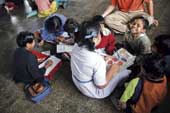 |
| A student of Loreto day school teaches boarders at Rainbow. Picture by Bishwarup Dutta |
There are only a handful of institutions who come to the aid of an abuse victim. With one girl child getting molested every minute, according to a survey, there should be more sanctuaries for those who are left on the streets to fend for themselves.
One school that cares for these destitutes and is trying to bring them under its wings is Loreto Day School in Sealdah. It started a separate wing, Rainbow, in 1983, to teach and provide shelter to destitute children.
“Here we teach the kids and make them fit for formal education,” says Sister Cyril, principal of Loreto Day School, who started the Rainbow project.
Rainbow was converted into a residential institution from a day school in 1998.
About 350 children are given preliminary education and then admitted to schools run by Calcutta Municipal Corporation and the Baptist Girls’ High School in Moulali apart from Loreto, Sealdah.
But not everyone gets access to Rainbow. “We conduct interviews and visit a candidate’s home to verify if they are really underprivileged. Most of these children live in shanties, on the railway station or on the streets,” says Jhimli Dasgupta, a social worker with the institution.
“Every child here has a past. Some come from broken homes and need counselling, some have been molested or trafficked. They need special care. We also organise monthly meetings with their mothers or guardians. For the past two years, we have also arranged for micro credit for the mothers to start small businesses of their own,” she adds.
Most of the parents are domestic labourers, vegetable sellers, sex workers or even beggars.
At Rainbow, a typical day starts at 5.30am. After assembly and morning chores, the students have a two-hour study session. They are then packed off to school. After school, the boarders enjoy an hour of leisure followed by the evening study session. The children also take turns to cook dinners and are off to bed by 9pm.
Regular students of Loreto Day School help these kids out with their lessons. Children from classes V to X spend their work education periods at Rainbow. About 50 Rainbow boarders are day scholars of Loreto.
Fifteen of them have sat for Madhyamik this year and another five are doing their graduation. The college girls are put up in nearby flats to make them independent. Those who are not keen on studies are given vocational training.
The children of Rainbow are a happy lot. “I have been here for seven years and I like studying. I want to become a doctor,” says Shehnaz Khatun, a student of Baptist Girls’ Higher Secondary School in impeccable English.
Jhinuk Mazumdar
Campus creativity
 |
| Actor Sabyasachi Chakraborty with students at Uniex |
Starting from photography to ad spoof and documentary films, the students of Techno India made management fest Uniex special. More than 10 city colleges participated in the two-day fest organised on March 30 and 31.
Inaugurated by actor Sabyasachi Chakraborty, the fest included competitive documentary screenings, a photography contest and management games. The first day began with a photography contest where Deepanwita Bhadro of Meghnad Saha Institute of Technology bagged the first prize. She had clicked a scene depicting rural Bengal.
In Documaniacs, participants screened original documentaries. Calcutta University (CU) bagged the first prize. “This is the best part of the whole fest as we got to see some really good documentaries,” said Santanu Dutta of CU.
Management programmes ruled on day two. For Bizplan, participants had to work out strategies for product launches ranging from cars to robots. This was followed by Bizgames, where participants had to come up with the best way of dealing with a tight situation. Examples included negotiating the sacking of an efficient worker, if one were in charge of the HR department in a company. Biswarup Bandyopadhyay of Techno India came first.
At the war of words, titled Bizbate, the topic for the day was “The economic development of developing countries is more important than caring for the environment”.
Debangana Saha
First year, BCA
Techno India, Salt Lake
Chit Chat
 |
Meet Rishika Das Roy, the newly crowned east zone Indian Climate Champion. The Class XII student of Modern High School was among five from the east zone to win the title. The other winner from Calcutta was Vishnupriya Das of Calcutta International School. Climate championship, 2008 was organised by British Council to make students more aware of climatic issues. Rishika beat around 400 students to the final rounds. “I want to keep working for a greener world,” says she. Rishika and her team plan to launch a campaign on environment-related issues on the lines of Buladi.










